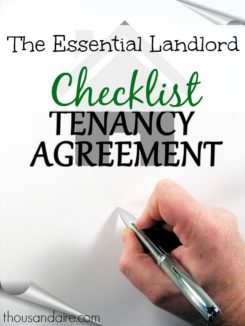Some people become accidental landlords simply by letting out their existing home when they have to move out for work or other reasons, and others set out to try and build a property empire.
Whether you are letting one or numerous properties, you are still a landlord and with that job title comes a set of rights and responsibilities that need to be observed and regulations that need to be adhered to.
This landlord checklist takes a look at what is involved in letting your property and what rules and regulations that you need to ensure compliance with.
Getting started
Preparation is everything when it comes to letting your property and there are a number of things that you need to address before you hand over the keys to your new tenant.
Take a look at addressing any minor repairs or maintenance issues before letting your property, such as fixing leaking taps, replacing light bulbs clearing any clutter that is unsightly and could also be a potential safety hazard.
In addition to the physical standards of the property being acceptable there are also safety standards that need to be met relating to gas and electrical services and also things like making sure any furniture like sofas, are flame retardant compliant.
Keeping your tenants safe
It is your responsibility as a landlord to make sure that any tenants in your property are protected to the best of your ability and that they are safe and free from any potential health hazards.
This will mean that all the gas and electrical equipment that you supply in the property has been safely installed and maintained according to current regulations.
The frequency of the safety checks will depend on whether your property is classified as an HMO, which is a House in Multiple Occupation. In England and Wales, your property will be considered as an HMO if at least 3 tenants live there from different families, or it is occupied by more than 5 people in total. Seek to verify the status of your property with your local council if you are unsure in any way.
Health and Safety
Local authorities operate a Housing Health and safety Rating System (HHSRS) which was introduced under the 2004 Housing Act and it may be that the council decide to carry out an HHRS inspection on your property at some point, to establish if you are compliant with these regulations.
This normally happens when a tenant contacts them to ask for an inspection because they feel it is not safe or it might be down to the fact that your rental property is situated in an area where other similar properties have been shown to be hazardous, so they will want to check that your is not in the same condition.
If you follow the rules relating to fire safety and have the gas and electrical equipment checked on an annual basis, you will not only be maintaining a good standard of health and safety in your rental property, but you will also be helping to keep the property fully rented with happy tenants who feel safe and comfortable in their surroundings.
Tenancy deposit
Rules came into place after April 6th 2007 that are designed to protect tenants deposits and if you rent out your home under an assured shorthold tenancy, you must use the tenancy deposit protection scheme.
This government-backed scheme is designed to provide a framework for receiving deposit monies and provides a system for releasing the money at the end of the tenancy subject to certain conditions being met.
You have to return the deposit to the tenant within 10 days of agreeing the figure to be returned and provided that they have met the terms of your tenancy agreement, there was no damage caused to the property and there are no rent arrears outstanding.
If you have a dispute with the tenant at the end of the letting period, you are entitled to keep the money within the scheme whilst you resolve any issues and agree on a final settlement figure if there are to be any deductions for damage or repairs etc.
Getting repairs done
If there are repairs to be carried out or faults that need rectifying whilst there are tenants in the property, you will need to give at least 24 hours’ notice of your intention to enter the property to inspect or carry out the work required.
You might be able to obtain immediate access in the case of an emergency, but the key to getting repairs done and keeping tenants safe is to maintain good dialogue with them and listen to any reasonable complaints or issues that are raised.
Being a landlord can be financially rewarding but it also comes with a set of responsibilities, which you ignore at your peril.
Tyler Cooper is a property investment consultant and researcher. He has also built up his own portfolio of buy to let properties. His articles mainly focus on the challenges of being a landlord.
James Hendrickson is an internet entrepreneur, blogging junky, hunter and personal finance geek. When he’s not lurking in coffee shops in Portland, Oregon, you’ll find him in the Pacific Northwest’s great outdoors. James has a masters degree in Sociology from the University of Maryland at College Park and a Bachelors degree on Sociology from Earlham College. He loves individual stocks, bonds and precious metals.

